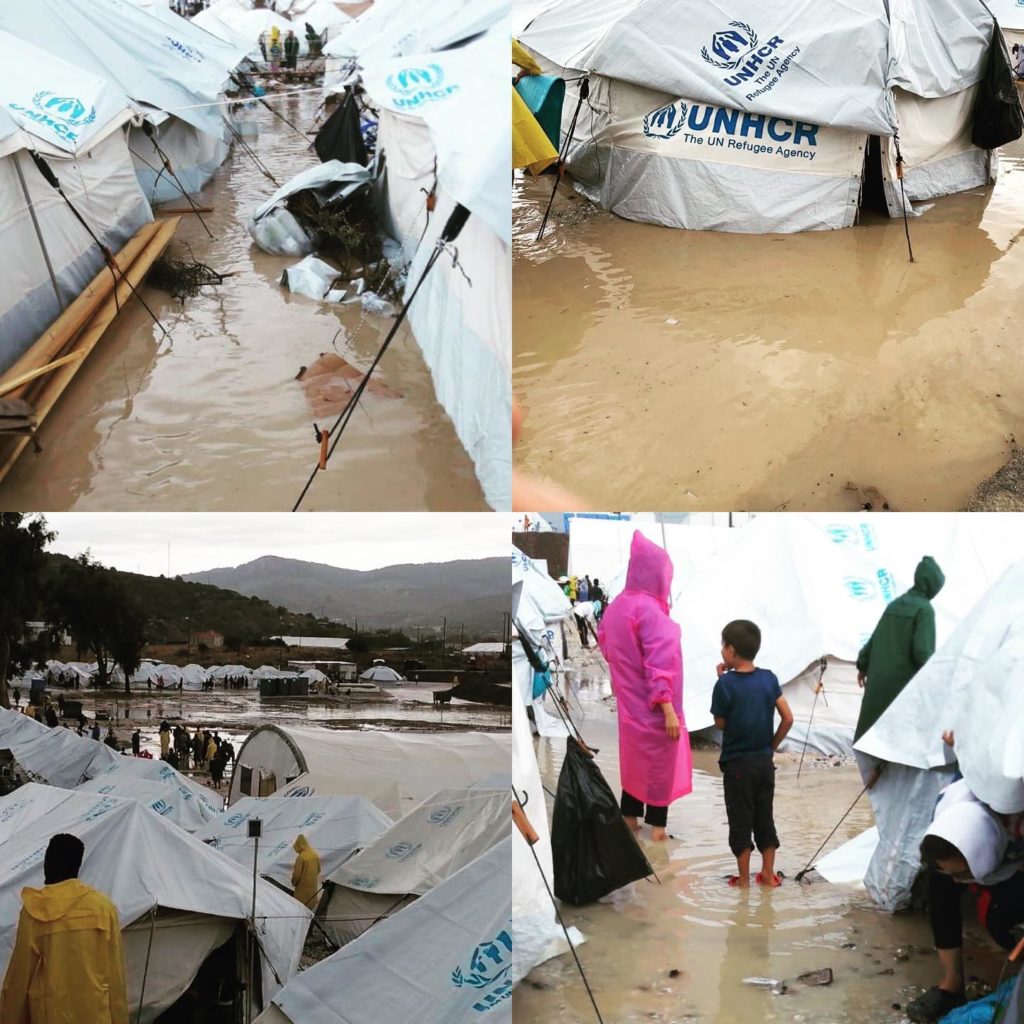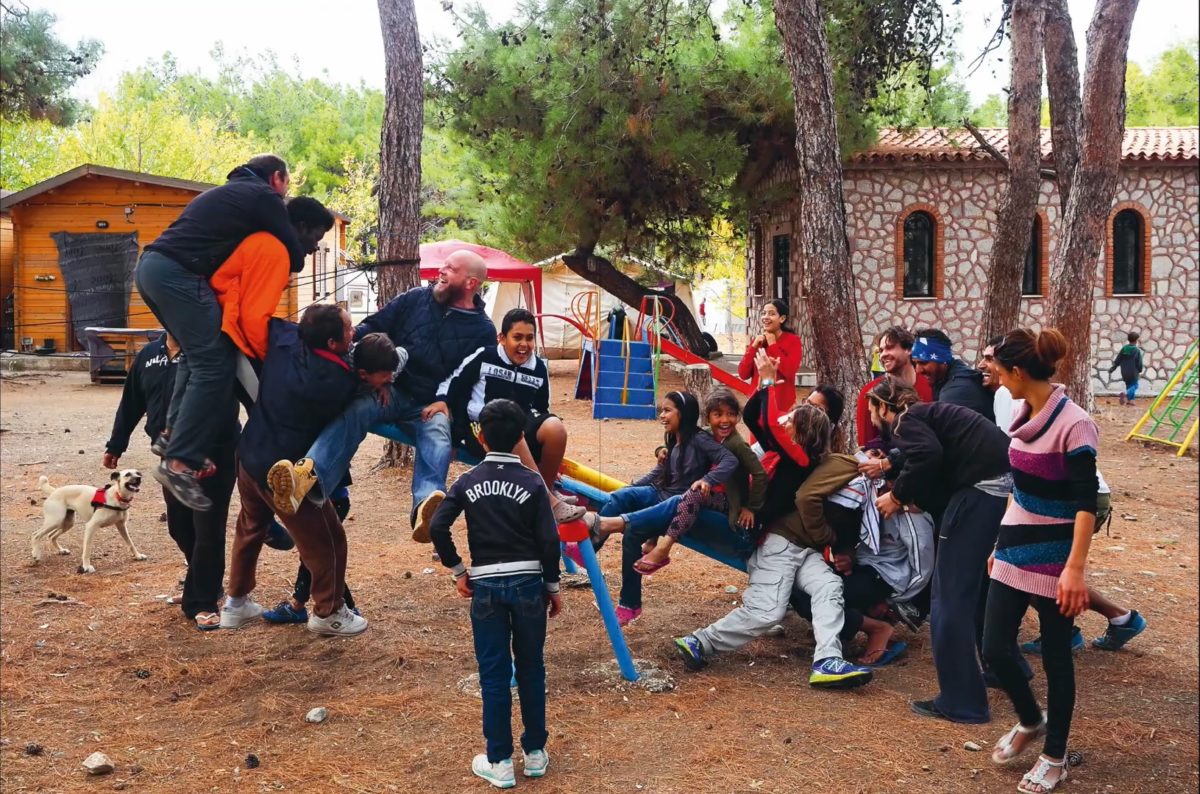It can hardly be a coincidence that no language on Earth has ever produced the expression ‘as pretty as an airport’. Airports are ugly. Some are very ugly. Some attain a degree of ugliness that can only be the result of a special effort.
– writes Douglas Adams in The Long Dark Tea-Time of the Soul.
What about a friendly refugee camp? Has Mr. Adams ever heard of one?
Have you?
Surrounded by barbed wire and guarded by armed forces, refugee camps – like Hungarian transit zones – are anything but friendly. Before burning to the ground in September 2020, Camp Moria on the Greek island of Lesbos, Europe’s largest refugee camp, was not called friendly by its inhabitants. Quite the opposite: they called it hell. And the one on Samos, putting up several thousand asylum seekers, was called Jungle by everyone – just like its counterpart in Calais, France.
We have gotten used to that. As for the conditions in the camps… we, outsiders, have gotten used to those as well. After all, there’s not much one could do, we tend to say, shrugging. And we tend to shake our head when the German weekly newspaper Die Zeit describes the conditions in the hell of Moria under the title “Die Leute hier leben wie die Tiere” (Where people live like animals). We shake our head because the title is disturbing. Because it is not hypocritical or euphemistic.
Die Zeit’s interviewee, Jean Ziegler, puts this into perspective. In his book Lesbos, la honte de l’Europe (Lesbos, the shame of Europe), soon to appear in Hungarian, he writes:
“While working as UN Special Rapporteur on the Right to Food, I traveled through Rocinha, the largest favela in Rio de Janeiro, the slums of the Smokey Mountain in Manila and the stinking shantytowns of Dhaka, Bangladesh. But never before have I been confronted with such squalid dwellings, with such desperate families, as in the ‘Olive Groves’ of Moria.”
But what to do? Refugee camps will be refugee camps, right? It’s certainly simpler to shake our head and shrug than to explore why and how people force other people to live like animals.
The line “We cannot accommodate all the misery in the world” is attributed to several people but was originally phrased slightly differently by French prime minister Michel Rocard in the National Assembly on June 6, 1989: “There is, in fact, too much drama, poverty and famine in the world for Europe and France to be able to welcome all those whom misery pushes towards them.”
Who could deny that?
Well, just a few miles from the infamous Moria, a few dozen volunteers from Mytilene have not only been saying but also proving for years, day in and day out, that there is an alternative to Moria. That the cultural anthropologist Margaret Mead was right when she said:
“Never doubt that a small group of thoughtful, committed citizens can change the world. Indeed, it is the only thing that ever has.”
In November 2012, the mayor of Lesbos approved the use of Pikpa camp, a former children’s resort, to host homeless asylum seekers. Citizens and collectives then created the “Village of Altogether”. Since 2012, it has welcomed and supported more than 30,000 people in need. The video summarizing these 8 years concludes:
“Pikpa camp is an exemplary model for the hosting of asylum seekers. With help and support from all over the world, it offers shelter, food, training, medical, psychological and legal support, at zero cost to the state.”
At zero cost to the state. Monsieur Rocard must be turning in his grave.
What could this collective possibly achieve if they received public funding from the European Union – say, the per-capita amount that the EU spends, at least nominally, on those suffering in the hell of Moria? Or if the Pikpa experience were put to use in hotspots, AKA first reception facilities? In the end, asylum seekers would feel that they are received with dignity – or even welcomed.
That’s obviously unthinkable. Because, as Jean Ziegler writes, hotspots are not meant for that purpose.
“Today, hotspots serve as part of a precisely targeted strategy of deterrence and terror. The aim is to inspire such fear that the persecuted would abandon any plans of leaving their country.”
And Pikpa is unsuitable for this purpose.
A few days before the above video was published in November 2020 – that is, seven weeks after the fire at Moria camp – Pikpa received a heavy blow. Never mind its long history of providing secure and friendly shelter to the most vulnerable, including unaccompanied minors and single mothers. Never mind that it spared its inhabitants the horrors endured by their peers in Moria, both during the fire and in the days that ensued, when they had no choice but to sleep on asphalt roads for several nights, even the children, without anything to eat or drink, and to wait in limbo because police blocked the roads. All that did not matter. Once Moria 2.0 – built on a former military shooting range, exposed to maritime winds and vulnerable to flooding, encircled by a 20-foot-high fence topped with three rows of NATO wire and guarded by 350 soldiers of the Special Forces – was up and running, Pikpa became unnecessary.
Not for those who lived in it or who were running it. But those who had the power to decide. And since it was deemed unnecessary, it also became undesirable – since its very existence could have held a mirror to Moria 2.0.
At 6:30 AM on October 30, 2020, some 60 armed policemen encircled the ancient children’s resort. They woke up the inhabitants – 74 asylum seekers, including 32 children – and ordered them to leave their home. The people of Pikpa complied. Volunteers of Lesvos Solidarity were ordered not to interfere. As was the press.
How did they feel, those people who, for years, had assumed the responsibility of the state and supported the most vulnerable asylum seekers? They were not asked. They were just instructed to follow orders.
How did they feel, those people who were forced to leave their friendly homes, with the intention of moving them to Moria 2.0, which had not only failed the first tests of heavy rain but was clearly unable to meet basic international standards for refugee camps? They were not asked. They were just instructed to follow orders.

For power does not ask questions. It issues instructions to follow orders, it sends armed forces, it bans. And there’s no way power would question its own decisions, question the conditions in the refugee camps of the Aegean hotspots, not least the abysmal state of mental health in those dire circumstances. “In all my years of medical practice, I have never witnessed such a large number of people suffering from such serious mental health problems as I am currently seeing among the refugees on the island of Lesbos,” said Alessandro Barberio, a psychiatrist working with Médecins Sans Frontières. According to The Guardian, one refugee in three has already contemplated suicide, and one in five has already attempted to end their lives.
But none of that seems to matter. What matters is that military-style order has finally been established. That the Coast Guard has been successful in its mission to the point that Prime Minister Mitsotakis expressed his appreciation for reducing the number of arrivals by 80% compared to the previous year. Obviously, Prime Minister Mitsotakis did not waste any words on the means used to ensure this achievement: that the Coast Guard, with the active complicity of Frontex, has systematically violated the UN Refugee Convention. What counts is the result: fewer people disembarked on the Aegean islands than were pushed back illegally.
This is the reality on the external borders of the European Union, a much-lauded laureate of the Nobel Peace Prize. And it is not a bug. It is a feature, by design. It has become painfully apparent that its design cannot tolerate friendly refugee camps.
(Edited by Joy Phillips)
Jean Ziegler’s book will be published in Hungarian in March 2021. You can support its publication here: https://www.ulule.com/levain-ziegler/
